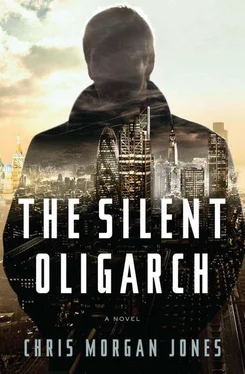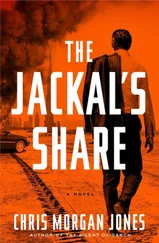His job then was to justify this certainty until all arguments dropped away, and for a while he let his mind play on how he might prove his case. If this were a project, what would he do? Interview the Kazakh convicted of her murder; go over the court documents; identify Malin’s security team; dig up immigration and flight details for Kazakhstan in the days leading up to her death; hope in vain to find a conscientious source. On his bench in Berlin Webster gave a cynical snort and shook his head slowly in frustration. None of this would work. None of it would be allowed to work. Some things in Russia were simply never meant to be known.
At six he called home and spoke to the children. Elsa was still at work and the nanny was cooking them tea. He wished he’d bought himself a bottle of water. It was almost eight when Prock left number 20, and a little after eight when Gerstman himself appeared. He turned right out of the door and walked purposefully toward Kurfürstendamm. Webster followed him, this time at a slow run, and caught up with him as he reached the main street.
“Herr Gerstman?”
“Yes?”
“My name’s Benedict Webster. I called earlier.”
“I have nothing to say to you,” said Gerstman and walked on, crossing the street through slow traffic. Webster was impressed by his coolness. He decided to take a risk.
“It’s about Richard Lock. I think he might be in danger.”
Gerstman stopped and looked at Webster properly for the first time.
“What sort of danger?”
“The sort where you go to prison. Or where you never get the chance.”
Gerstman continued to stare at Webster, judging his face, his expression blank.
“All right. I cannot see you now. Meet me in the bar of the Adlon at eleven. The lobby bar.”
WEBSTER WENT BACK to the hotel, showered, and put on his fresh shirt. He had dinner where Gerstman and Prock had had lunch, and got to the Adlon at ten. What a grand hotel this was; how much grander the original must have been before it was torn down. The lobby bar, all deep chairs and soft lamplight and gentle piano music piped from the ceiling, was not busy. He took a seat at the bar, ordered a whisky with ice and a little water and phoned Elsa. They were odd, these conversations: the farther away from London he was the better they tended to be. This one was fine, but Webster, half watching for Gerstman’s arrival over his shoulder, was distracted. They talked for ten minutes at most.
Gerstman was on time. Webster watched him walk across the lobby and noted his long, elegant stride. His face was tanned and fit to the point of being gaunt, and a raised vein snaked across his left temple. Hammer had such a vein, and Webster wondered what it signified.
Webster got down off his stool—upholstered in leather, of course, with a low back—and held out his hand to Gerstman, who ignored it and sat down on the next stool, shifting it so that he almost faced Webster.
“What do you have to say?” said Gerstman, his eyes impatient and cold. His accent was clipped and heavily Russian.
“Well—first, thank you for coming. Can I get you a drink?”
“No drink, thank you. Just tell me why you bother me here.”
Webster took a sip of whisky and tried to work out what was behind this hostility, which was starker than he had expected. There must be a way around it. Gerstman had known Malin: worked for him day in, day out; sat with him in meetings; listened to his confidences. He knew how his business was organized, who sat where, where the money came from. He was about as good a source as you could hope for, and Webster could feel him slipping away.
“I work for a company called Ikertu Consulting,” Webster said, looking Gerstman in the eye and hoping to appear frank, straightforward.
“I know it.”
“Good. That helps. We’ve been hired to do some work relating to Konstantin Malin. As part of that work we have become aware that Richard Lock’s position is highly compromised.”
“I don’t know what that means.”
Webster took another drink. “Well, briefly, that agencies all over the world would like to investigate him. When they do they’ll think he’s a money launderer. Which he probably is.”
“You mean you would like them to investigate him.”
“No, we wouldn’t. That doesn’t suit us. I’d like to give him the chance to avoid that.” Gerstman didn’t respond. “Can I ask you some questions about Malin?”
“No, you cannot. You do not tell me who you are working for and I do not know how you will help Richard. But I do not talk about my past career to anyone, so it does not matter. I do not talk about it under any circumstances. I met with you so that you could know that. Beyond doubt.”
Webster did his best to look unconcerned. “I understand. Not even to help Lock?”
“Please, do not be silly.” Gerstman stood up. “You do not care for Lock. You pretend this for reasons I do not understand. Now, do not trouble me again. And tell your client that I do not talk. Clear? I do not talk.”
Webster watched as he walked away across the lobby, his heels clicking on the marble floor. With his long stride and bowed head he seemed propelled, forced onward by something that might have been pride but to Webster looked like fear.
LOCK STOOD in the almost empty ballroom and wondered what Maria Sergeevna Galinin would be getting for her birthday. The children of the Moscow rich could expect good presents: he had seen a six-year-old boy presented with a Ferrari, and a nine-year-old girl with a dacha outside the city, an immense Wendy house fitted out for children with its own servants and a maze planted in yew.
For his own sixth birthday Lock’s father had given him a wooden boat. It was modeled on a Dutch clipper, with three masts, each with sails of undyed canvas, and but for a metal keel was made of cedar and therefore, his father had said, strong enough to be sailed. On windy days they would take it to the boating lake in Den Haag park and Lock’s father would teach his son about rigging and tacking, how one could sail a real boat into the wind. “One day we will do this for real and you can take the tiller,” he would say. Lock had loved the boat. When not on the water it had sat on a shelf in his room rousing his imagination to great maritime feats. But when the time had come he had never taken to the sea itself. Where he had expected adventure there were long afternoons clumsily following his father’s commands; where he had expected loneliness and calm there were the battering roar of the wind and the angry snapping of the sails. The sea frightened him, he had discovered, and under his father’s impatient instruction he became still more nervous around it. In time they barely went out anymore, and what Everhart Lock never understood was that his own disappointment was no greater than his son’s.
Now Lock saw his father only rarely—perhaps once a year, since the death of his mother. He would visit in the summer with Vika, and the three of them would go to the beach, Vika playing in the dunes, the two men talking about her and little else. Often they sat in silence, having tacitly agreed long ago not to discuss work or Russia or family. Any mention of Lock’s life would instantly spark Everhart’s disapproval, at once fiery and stern, like a rock glowing with heat. Side by side on the sand they would sit, quietly watching the sea that had for so long lain between them.
The invitation had said to come to the Hyatt Ararat at six o’clock on Friday evening for a tea party. Lock and Oksana had arrived at twenty past to find only eight other guests there, all couples, all, Lock saw with a glance, professionals and their wives. He had assumed that because this was a child’s party they should be more punctual than usual but had clearly miscalculated. Perhaps they could leave and come back in an hour. A waitress in a pink pinafore and matching maid’s cap approached with a tray full of delicate glass teacups, frosted with cold.
Читать дальше












